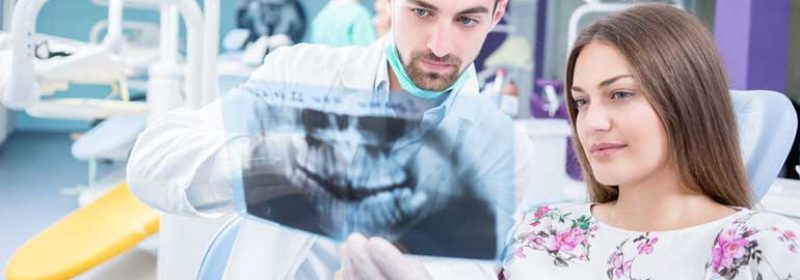
|

|

|

|

When do you need dental x-rays and are they safe?
An X ray is a type of energy that is absorbed by hard dense tissues, but passes through soft tissues. Teeth and bone are dense tissues therefore they absorb x rays and as a result we get a graph of dense surfaces like bone and teeth. Dental x rays are also known as radiographs. Any good dental care facility depends on dental x rays to be able to carry out checking and treatment of various dental problems. Dental x rays are basically a diagnostic tool, but in many cases it becomes preventive tool by enabling the dentist to diagnose potential oral care problem before they become a major concern.
There are two types of x rays. Intraoral which are taken inside the mouth, and extra oral which are taken outside the mouth.
Intraoral radiographs are very commonly taken x rays in dental care profession. Intraoral x rays give a high level detail of teeth, bones and supporting dense tissues in the mouth. The x rays allow the dentist to find cavities, check the bones and teeth roots, and generally have a detailed map of the inner mouth.
With such details the dentist can visualize the problems of the teeth, and surrounding area of the teeth which cannot be studied by simple oral inspection. X rays help in prevention as by looking at the condition of teeth and mouth the dentist will take precautionary measures.
When do you need X rays?
There are mild or severe dental conditions when the dentist is unable to make a decision about what and how much damage has been done to your teeth and surrounding tissue. To make sure what exactly should be the course of action, he will want to see the inner mouth with the help of x rays. Usually the first time patient has to go for x rays so that the dentist know the history.
The need for x rays for your teeth and mouth depends on your medical and dental condition. If you suffer from severe dental problems, you may need dental x rays more frequently than people who are in good dental health and who visit their dentists more regularly, hence keeping good dental hygiene.
When you visit your dentist for the first time, the dentist may want to take more x rays to study your present dental status and to make a record which will decide which line of treatment you need if any.
The patient who has decayed teeth and gums, who are at high risk may need more x rays than patient who are more regular and keep good dental hygiene. Children who have problems in eruption of first permanent teeth may require x rays to see all surfaces of teeth eruption properly. In general children need more x rays because their teeth are smaller, therefore decay reaches inner part of their teeth; dentine, faster and spreads quickly.
For adolescents x rays will be needed if there is an indication of problems with eruption of wisdom tooth. Also when because of poor dental health or certain lifestyle choices, some adolescents need more extensive dental treatment hence more x rays. Adolescents and adults who smoke or consume lots of sugary food, also are at high risk for development of cavities and dental diseases.
When a history of dental disease is present in a patient, then a full series of x rays are ordered for individual patient. Some patients need to take an extensive restorative treatment and therefore they need more x rays to check for properly filled fillings, decay beneath fillings or decay in new places.
People with gum diseases, and bone loss need more x rays to check the extent of bone loss. People who are on medication for depression or anxiety or any other ailment require more treatment and hence more x rays.
Are Dental x rays safe?
Radiation of any kind is harmful to the body. Radiation from the sun for example, when you expose your skin to the sun without protection, leads to skin cancer. Radiation from the minerals in the soil, radiation from home appliances and gadgets like mobile phone and of course x rays all damage human body. But how extensive the damage is depends on the dose of radiation. The radiation factor is quite worrying when we are exposed to x rays for whatever reason.
Fortunately the amount of radiation we are given during x rays is quite small, and such a small amount does not really count unless it becomes regular. Digital x rays emit even smaller amount of radiation.
Dental x rays expose adults and children to a minimal dose of radiation. There are guidelines for standard safety precautions for procedure for taking x rays. The x ray equipment today are operated in such a way that all unnecessary radiation is eliminated. It allows the operator of the equipment to focus the x ray beam on the exact part of the mouth that the dentist want to examine. High speed film enables the machine operator to reduce the radiation the patient receives to a minimum. The patient is covered in a lead apron so as to protect the body from stray radiation from neck to knee.
The technology in dentistry is improving day by day. This advance has lead to quite a few measures that has minimized radiation risks from x rays. But the problem has not been done away with. Radiation in small doses over a period of time builds up over a lifetime. Every little bit of radiation from whichever source is added together is a worrisome phenomena.
It is important to talk the matter over with your dentist. If you are worried about the radiation from x rays than discuss with your dentist, the dose of radiation and its effect on your body. Also discuss how often x rays can be taken and why the x rays are to be taken in the first place. The current guidelines are strictly dictates that x rays are to be taken only when needed for clinical diagnosis.






